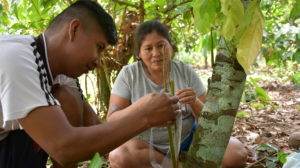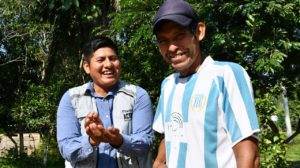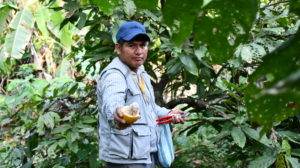Will new global agreement to protect biodiversity deliver for people and the planet?
Authors: Julieta Vargas, Anna Svensson
Early on Monday morning (Canadian time) delegates at the UN Biodiversity Conference, COP15, in Montreal delivered a historic deal. The Kunming-Montreal Global Biodiversity Framework sets out ambitions to protect at least 30% of the planet and reverse biodiversity loss by 2030.
Almost 200 countries have signed this important agreement. Not a second too late, as around one million species already face extinction.
It’s worth noting that the USA is not one of the countries that have signed the agreement. Also, some African countries, including the Democratic Republic of the Congo, are unhappy with the final deal.
Recognition of the unique role local communities must play
At Practical Action, we recognise that there are weaknesses in the deal, including those raised by DRC and other low-income biologically diverse countries around financing for conservation. We also acknowledge that the success of the deal depends on governments’ ability and willingness to urgently pay for and deliver what has been agreed.
This deal cannot be seen as the destination, but rather an encouraging first step on the journey we need to embark on together in other to achieve the aim of living in harmony with nature by 2050.

Learning to improve cocoa crops
Farming that works for the planet
The new framework calls for more sustainable and biodiversity-friendly farming practices that deliver resilient systems and food security. Our Head of Agriculture, Chris Henderson reflected:
It’s great to see practices we have been developing and implementing with communities across the globe recognised in this global agreement. In practice we want to see the uptake of more regenerative agriculture practices.
We have spent decades working together with smallholder farmers to promote farming practices that look after the soil and support biodiversity, while also feeding families and supporting livelihoods.
We work with small-scale coffee and cocoa farmers in the Amazon zone in Peru and Bolivia, using an agroforestry approach where coffee, cocoa and other crops are grown together with other trees and plants. This replicates how these plants grow in the wild. This technique increases biodiversity and improves diversity. It ensures the abundance of species and prevents damage to ecosystems, without stopping productive activities. It offers a mosaic of possibilities to improve food security and their economy.
Through Farmer Managed Seed Systems, women in rural Zimbabwe select, store, and trade locally adapted seeds that are more diverse and resilient than commercial cash crops. These systems contribute to a biodiverse farming landscape and play a vital role in ensuring food security in rural communities impacted by climate change.
We must support and learn from Indigenous Peoples
We are glad to see our call for the deal to acknowledge and protect the unique and invaluable role that local communities, young people, women and Indigenous Peoples play in protecting our natural world recognised throughout the text.

Nolberto and Gabriel working together
Our work with Indigenous Peoples in Bolivia
In Bolivia, we work with people in four ecosystems, including many from indigenous backgrounds. We work with Tacana indigenous population, in the Bolivian Amazon, in the buffer zone and gateway to the Madidi national park – one of earth’s mega biodiverse locations. This population has a long tradition of managing and conserving their natural resources. These communities follow under the vision of their territorial management, which allows them the sustainable use of natural resources (e.g., forest species or lizard skin and meat, honey, coffee, handicrafts, palm fruits and medicinal plants).
In this remote location, employment options are limited, and we work with community members, particularly women, to develop sustainable alternatives to extractives activities that contribute to biodiversity loss.
Additionally, we’ve supported local young people to get organized on issues that matter to them. Much of their focus has been on the protection of local ecosystems, biodiversity, including culture and sustainable tourism.

Cocoa from Tacana territory
What’s next?
Practical Action will continue to work with the people on the frontlines of the interconnected climate change and biodiversity crisis. We urgently call for global action and increased investment in innovative solutions that work for people and the planet.
Author biographies
Julieta Vargas
Julieta has a degree in biological sciences from the Universidad Mayor de San Andrés. She has extensive experience as a natural resource specialist and has worked as a researcher and consultant in the public and private sectors. She has worked at Practical Action Bolivia since 2013 and is a member of the World Commission on Protected Areas (IUCN) and the Network of Women for Conservation in Latin America and the Caribbean; Julieta has specialized in project management, tropical ecosystems, natural resource management, Amazonian culture and protected areas.
Anna Svensson
Anna is the Senior External and Engagement Officer at Practical Action. She leads, creates, and delivers campaigns and opportunities to promote and disseminate Practical Action’s experience, expertise, and knowledge to scale our impact.